 |
| Studying abroad and obtaining an international degree – once considered by China’s middle class as the foundation for future success – is losing its appeal. (Source: SCMP) |
Realizing that the future was uncertain, Ms. Eva Deng, a human resources manager living in Shenzhen - a city in Southern China, was forced to make a difficult decision that she had never thought of - transferring her 12-year-old son from an international school to a public school.
Despite achieving fluency in English, Eva Deng eventually abandoned plans to send her children to study abroad in the UK or the US, instead setting her sights on China's top universities to study majors related to emerging science and technology such as semiconductors or artificial intelligence (AI).
The boy finished his six-year British education program to participate in national competitions in Programming, Mathematics and Science - important subjects for Chinese students when considering admission to the country's top high schools and universities.
Eva Deng, preparing her son for a future entry into a prestigious Chinese university, has also spent tens of thousands of yuan on programming courses. "It seems that excellent graduates from domestic universities will have a brighter future that is more in line with the needs of the Chinese economy ," she predicted.
When international education is no longer the first choice
Cases like Eva Deng's are becoming more common in China - reflecting a shift in demand among middle-aged people in the world's second-largest population - who once considered international education the optimal choice.
According to education experts, the driving force for the shift comes from geopolitical risks and the instability of the world situation. Along with that, slowing economic growth, financial risks, real estate market crisis... make unemployment among young people increasingly high.
“It’s not just my son – some other students in the class are also thinking about transferring to public schools as parents start to consider their children’s future amid the volatile international situation. Studying at a local university might be better for their children,” said Eva Deng.
| Related news |
 Chinese students studying abroad "disillusioned" when returning home Chinese students studying abroad "disillusioned" when returning home |
Meanwhile, according to Ms. Fang Li, another parent in Guangzhou whose child is studying at an international school, the tuition fees for studying abroad are still rising - it can take up a huge amount of savings, averaging 600,000 - 700,000 yuan/year for a middle-class family.
Although Ms. Fang Li had previously planned to send her child to study abroad in the US, she is now becoming more cautious when considering financial issues, especially in the context of the domestic economy also facing many difficulties.
Ms. Fang Li said that while in the past most middle-class parents wanted to send their children to study abroad, now that view has changed quite a bit. "Young students studying abroad are in an increasingly awkward position. They are facing a future where job opportunities for international students in Europe and the US may decline sharply due to geopolitical influences, while the domestic job market is also becoming increasingly competitive," she analyzed.
Another concern for Chinese parents in recent years has been the rise in violence and racial discrimination against Asians in some Western countries, which has been on the rise during the pandemic and following a series of anti-immigration policies by the Trump administration.
"We always want our children to be exposed to different cultures and broaden their horizons, but issues of racial discrimination and cultural conflicts are becoming increasingly difficult to balance," Ms. Eva Deng worries.
Unlike many years ago, when foreign degrees were often valued more by Chinese employers than degrees from an average domestic university, there are now many signs that foreign degrees are no longer favored in the Chinese job market.
According to a recent talent trend report conducted by Chinese recruitment company Liepin, in the first and second quarters of 2025 alone, more than 70% of Chinese employers said they have no need to recruit human resources with foreign degrees.
Even some big cities like Guangdong and Beijing have issued regulations that people returning from abroad will not be allowed to participate in the special civil service recruitment program - which is for graduates of the country's top universities.
Besides, "compared to previous generations, the GenZ generation - born after 2000 in China - grew up in better-off conditions and have a better sense of national pride - is no longer interested in studying abroad" - said Chen Zhiwen, an education researcher and member of the China Education Development Strategy Association.
The association also said that fewer graduates from China's top universities are choosing to pursue higher education abroad. Peking University said that the number of undergraduates pursuing higher education abroad in 2024 fell by about 21% compared to 2019, before the pandemic. Tsinghua University saw a 28% drop in the same period. Beijing Institute of Technology recorded a 50% drop. The University of Science and Technology of China and Fudan University also reported declines of 28.57 and 17.7%, respectively, in the same period.
Xiong Bingqi, director of the 21st Century Education Research Institute, a Beijing-based think tank, noted that China’s current study abroad culture remains largely degree-oriented. But the trend is now losing its appeal as the number of foreign students and returnees increases.
"Along with the significant financial investment, the value of studying abroad for a degree as a motivation is increasingly being questioned," said Xiong Bingqi.
America is losing its appeal
Not only turning to domestic universities, many middle-class families are also sending their children to study abroad in Southeast Asian countries that offer international education services but with lower living costs than the US and Europe.
A report from leading recruitment firm Zhaopin.com shows that the proportion of graduates returning from Malaysia and Singapore in 2024 has increased by 70.5% and nearly 35% respectively, due to the relatively high quality of education and low cost of living.
The UK is also a popular destination for Chinese students, especially amid growing tensions between the world's two leading economies.
“More and more study abroad institutions are offering A-level courses, targeting the UK, while eliminating the Advanced Placement (AP) curriculum, targeting the US,” said Baron Wu, an expert from a large international education company based in Beijing.
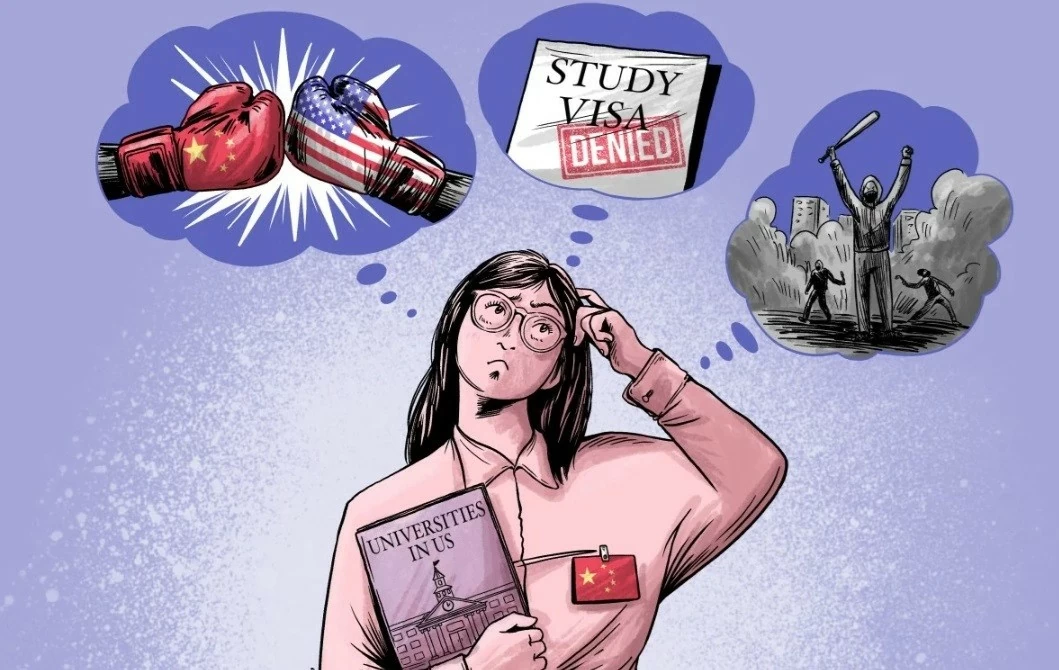 |
| Studying in the US is losing its appeal to Chinese students. (Source: SCMP) |
Data from China's Bureau of Consular Affairs shows that the number of new US student visas - F-1 visas - issued to Chinese nationals in the 2023 academic year is also down about 18% compared to 2019. Once a top destination for Chinese students, the US has lost significant appeal compared to many other countries.
According to the 2023 Open Doors Report on International Educational Exchange released by the Institute of International Education, the number of Chinese students in the US has dropped to its lowest level since 2014, at less than 290,000 students.
The significant decline in the number of Chinese students studying in the US also comes from the policies of President Donald Trump's administration. According to NBC News , as of April 16, the US government had revoked visas for international students in at least 32 states, just three months after Trump took office. Lawyers and immigration policy experts said the focus on international students is part of a larger crackdown on immigration and deportation by the Trump administration, with immigrants of all statuses under close scrutiny.
The new administration is also pressuring Harvard University to provide security agencies with detailed records of international students as part of a broader effort to force top US universities to comply with new regulations.
“It’s just part of their whole plan to completely reduce immigration,” said Jath Shao, a Cleveland-based immigration attorney who runs an online law firm and represents a number of international students, most of them Asian. “They’re targeting the small and the weak—people who don’t have a lot of resources to defend themselves.”
Students and universities say there is widespread confusion about the reasons behind the visa revocations, the legality of the government's actions, and what options those who have lost their visas or residency status have to continue their studies.
Chinese students remained the largest group of international students in the US for 15 years, until India overtook them last year. According to data from the Institute of International Education (IIE), Chinese students contribute about $14.3 billion to the US economy through tuition and living expenses.
Source: https://baoquocte.vn/rui-ro-dia-chinh-tri-gia-tang-cac-bac-cha-me-trung-quoc-dan-quay-lung-voi-giao-duc-quoc-te-314735.html



![[Photo] 60th Anniversary of the Founding of the Vietnam Association of Photographic Artists](/_next/image?url=https%3A%2F%2Fvphoto.vietnam.vn%2Fthumb%2F1200x675%2Fvietnam%2Fresource%2FIMAGE%2F2025%2F12%2F05%2F1764935864512_a1-bnd-0841-9740-jpg.webp&w=3840&q=75)
![[Photo] National Assembly Chairman Tran Thanh Man attends the VinFuture 2025 Award Ceremony](/_next/image?url=https%3A%2F%2Fvphoto.vietnam.vn%2Fthumb%2F1200x675%2Fvietnam%2Fresource%2FIMAGE%2F2025%2F12%2F05%2F1764951162416_2628509768338816493-6995-jpg.webp&w=3840&q=75)



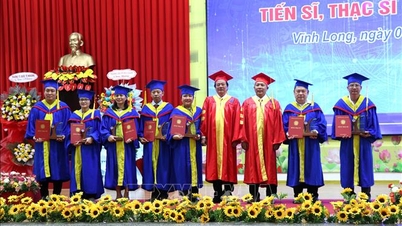








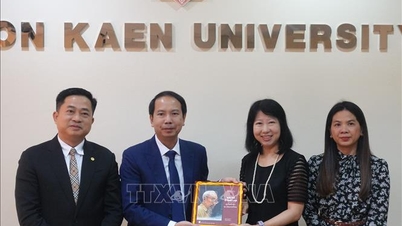




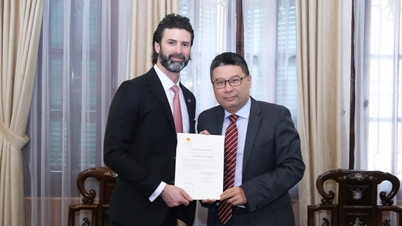


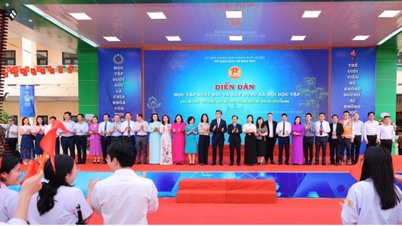

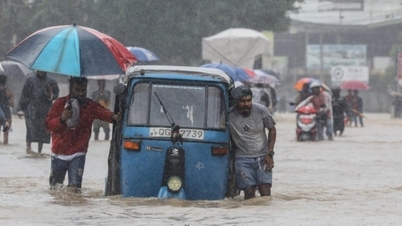













































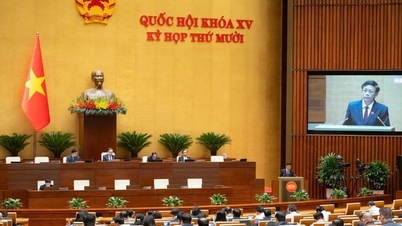











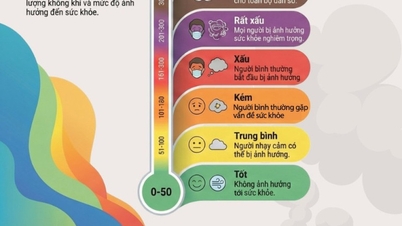



















Comment (0)